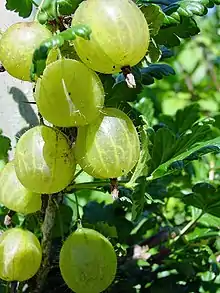agrest
Old Polish
Alternative forms
Descendants
- Polish: agrest
References
- Brückner, Aleksander (1927), “agrest”, in Słownik etymologiczny języka polskiego [Etymological Dictionary of the Polish Language] (in Polish), Warsaw: Wiedza Powszechna
- Witold Doroszewski, editor (1958–1969), “agrest”, in Słownik języka polskiego (in Polish), Warszawa: PWN
- B. Sieradzka-Baziur, editor (2011–2015), “agrest, hrabrest”, in Słownik pojęciowy języka staropolskiego [Conceptual Dictionary of Old Polish] (in Polish), Kraków: IJP PAN, →ISBN
Polish

agrest
Alternative forms
- agresta (Middle Polish, 16th-early 17th century)
- angrest (Middle Polish or dialectal, since the 18th century)
- agreszt (Middle Polish, 17th century)
Etymology
Inherited from Old Polish agrest (“a type of sour wine”), from Latin agrestis.[1][2] First attested in 1472.[3]
Pronunciation
- IPA(key): /ˈa.ɡrɛst/
Audio (file) - Rhymes: -aɡrɛst
- Syllabification: a‧grest
Noun
agrest m inan
- European gooseberry, gooseberry (Ribes uva-crispa) [from 16th c.][4]
- 2000, Roman Antoszewski, Kariera na trzy karpie morskie, Philip Wilson:
- Zupełnie zapomniałam, ten słoik z konfiturami truskawkowymi na cukrze wyniosłyśmy do piwniczki z Baśką, bo tu nie było miejsca. Tu mam agrest, ale Władek najlepiej lubił truskawki mocno scukrzone, choć mu to szkodziło.
- I had completely forgotten that I took this jar of strawberry sugar preserves out to the basement with Baśka because up here there was no room. Here I have gooseberry, but Władek loved strongly sweetened strawberreis best, even though it was bad for his health.
- chiński agrest ― Chinese gooseberry
- dziki agrest ― wild gooseberry
- zielony agrest ― green gooseberry
- czerwony agrest ― red gooseberry
- czarny agrest ― black gooseberry
- krzak agrestu ― a gooseberry bush
- krzew agrestu ― a gooseberry shrub
- owoc agrestu ― a gooseberry fruit
- uprawa agrestu ― gooseberry cultivation/growing/crop/farming
- liście agrestu ― gooseberry leaves
-
- (Middle Polish) fine sour wine [15th–17th c.][3][5]
Declension
Descendants
- → Old Ruthenian: а҆́ґрестъ
References
- Brückner, Aleksander (1927), “agrest”, in Słownik etymologiczny języka polskiego [Etymological Dictionary of the Polish Language] (in Polish), Warsaw: Wiedza Powszechna
- Witold Doroszewski, editor (1958–1969), “agrest”, in Słownik języka polskiego (in Polish), Warszawa: PWN
- B. Sieradzka-Baziur, editor (2011–2015), “agrest, hrabrest”, in Słownik pojęciowy języka staropolskiego [Conceptual Dictionary of Old Polish] (in Polish), Kraków: IJP PAN, →ISBN
- “agrest”, in Słownik Polszczyzny XVI Wieku [A Dictionary of 16th Century Polish], 2010-2022
- Teresa Sokołowska (21.05.2019), “AGREST”, in Elektroniczny Słownik Języka Polskiego XVII i XVIII Wieku [Electronic Dictionary of the Polish Language of the XVII and XVIII Century]
Further reading
- agrest in Wielki słownik języka polskiego, Instytut Języka Polskiego PAN
- agrest in Polish dictionaries at PWN
- Samuel Bogumił Linde (1807-1814), “agrest”, in Słownik języka polskiego
- Aleksander Zdanowicz (1861), “agrest”, in Słownik języka polskiego, Wilno 1861
- J. Karłowicz, A. Kryński, W. Niedźwiedzki, editors (1900), “agrest”, in Słownik języka polskiego (in Polish), volume 1, Warsaw, page 14
Romanian
Adjective
agrest m or n (feminine singular agrestă, masculine plural agrești, feminine and neuter plural agreste)
Declension
Declension of agrest
This article is issued from Wiktionary. The text is licensed under Creative Commons - Attribution - Sharealike. Additional terms may apply for the media files.